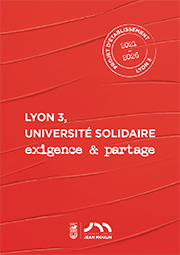AccueilRechercheProgrammes et productions scientifiquesThèsesThèses soutenuesThèses soutenues - 2006-2021Thèses soutenues - 2010
-
Partager cette page
- Recherche,
DIGONNET Rémi
Approches cognitives de la métaphore dans le domaine de l'olfaction. Anglais - français
Thèse en linguistique générale, langues slaves, langues romanes, didactique des langues Soutenue le 1er juin 2010
Ce travail de recherche aborde une approche cognitive de la métaphore dans le domaine de l'olfaction. Il met ainsi en perspective la métaphore avec l'univers olfactif. La perception mineure de l'odeur, tant historique que cognitive, se reflète dans un discours olfactif a minima. Peu de termes particuliers existent pour caractériser l'odorat. À partir de ce constat, l'objectif de la métaphore est double : développer une meilleure perception de l'odeur d'une part, et véhiculer d'autres perceptions par l'intermédiaire de l'odeur d'autre part. Ce double objectif correspond au double positionnement métaphorique de l'odeur : une entité qui vaut autant pour le domaine cible que pour le domaine source. L'appartenance de l'odeur au domaine cible témoigne d'une richesse métaphorique considérable au profit de l'olfaction. Grâce à la métaphore, l'odeur gagne une trajectoire, une matérialité, une spatialité ainsi qu'une temporalité, une ontologie et certains pouvoirs. L'odeur devient davantage perceptible et accrédite la métaphore de son statut perceptif. L'appartenance de l'odeur au domaine source développe certaines perceptions récurrentes : négative, approximative, intégrative. L'étude de ces trois motifs, à l'aune des théories cognitives contemporaines de la métaphore, révèle d'une part, le caractère motivé de la métaphore olfactive et confirme d'autre part, l'invention de sens véhiculée par la métaphore. À travers un corpus anglais et français, la mise au jour des métaphores olfactives, doublée d'une connaissance approfondie de la métaphore et de l'odorat, révèle un spectre métaphorique large qui s'explique, en grande partie, par le double positionnement métaphorique de l'odeur. Mots-clés : APPROXIMATION, COGNITION, DISCOURS, INTEGRATION, METAPHORE, MOTIVATION, NEGATION, OLFACTION, PERCEPTION.
This doctoral dissertation tackles a cognitive approach to metaphor in olfaction. Metaphor appears in an olfactory perspective. Minor perception of smell, both historical and cognitive, mirrors an olfactory discourse reduced to the bare minimum. There are few specific terms referring to smell. From this observation, the objective of the metaphor in the sense of smell is twofold: to develop a better perception of smell on one hand and to convey new perceptions thanks to smell on the other hand. This twofold objective matches a double metaphoric positioning of smell: an entity which either fits into a target domain or source domain. Smell, as target domain, reveals a great amount of metaphors benefitting the sense of smell. Thanks to metaphor, smell gains its own trajectory, substance, space and time, ontology and power. Smell becomes more observable and confirms the metaphor in its perceptive status. Smell, as source domain, entails recurrent perceptions: negative, approximative, and integrative. The study of these three motifs in light of contemporary cognitive theories of metaphor attests the motivation of metaphor in the field of smell, and then confirms the invention of meaning through metaphor. The examination of olfactory metaphors, using an English and French corpora in addition to an in-depth study of both metaphor and smell, reveals a large metaphoric spectrum, which can be attributed to the double metaphoric positioning of smell. Key-words : APPROXIMATION, COGNITION, DISCOURSE, INTEGRATION, METAPHOR, MOTIVATION, NEGATIVE, OLFACTION, PERCEPTION. Directeur de thèse : Denis JAMET Membres du jury : Catherine RESCHE, Professeur, Université Panthéon Assas - Paris 2 Jean-Rémi LAPAIRE, Professeur, Université Michel de Montaigne - Bordeaux 3 Albert HAMM, Professeur, Université de Strasbourg Catherine PAULIN, Maître de conférences HDR, Université de Franche Comté - Besançon Denis JAMET, Maître de conférences HDR, Université Jean Moulin Lyon 3 Mention : Très honorable avec les félicitations du jury Equipe d'accueil : CEL






